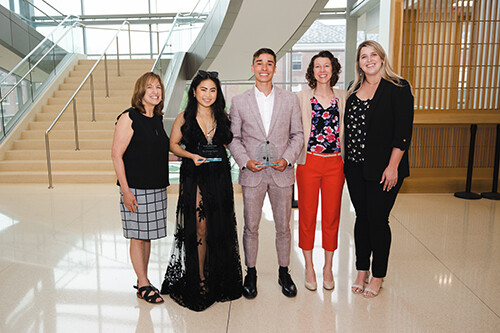
As members of the inaugural cohort of the Inclusive Business Leaders Program at the University of Nebraska–Lincoln College of Business, sophomores Naree Philavanh and Niko Schultz joined the program set on advancing diversity and inclusion efforts on campus and in the workplace. Now with a new cohort starting their Nebraska experience, the two serve as mentors to help guide the next group of students through shared experience and peer-to-peer support.
“Naree and Niko have played an influential role in shaping the IBL Program,” said Kasey Linde, associate director of the Teaching and Learning Center and program coordinator for Inclusive Business Leaders, who helps facilitate the program. “They participated in a strategic planning workshop to redesign the course curriculum for the second cohort and the suggestions they made improved the experience for our current cohort.”
The cohort-based program prepares first-year business students to lead in today’s diverse work environment through an IBL course where they learn more about diversity, equity and inclusion through theory, group projects and discussions. The program also offers formal mentoring and hands-on learning opportunities, encouraging a sense of community among the students. Within it, Philavanh found a space to express herself in a welcoming environment where she felt like she mattered.
“This program gives me a place to be myself without judgment and accepts my input as to how to improve the program for future IBL students. Our IBL-specific course prepared me to be a business student by providing a safe space in the College of Business where my voice is heard and a community that celebrates and supports one another,” said Philavanh, a management and marketing major from Lincoln.

For Schultz, a marketing major from Joliet, Ill., the peer mentorship component of the program provided an outlet for success when he struggled with a course.
“I had no hope of passing a class, and one of my mentors, Ann Vu, put me in contact with another mentee who was in the same class as me,” he said. “We came up with this amazing studying strategy and both ended up passing the class with an A. After this experience, I knew I wanted to help other mentees with their freshman year experience.”
Both Philavanh and Schultz flourished in the program, growing more involved on campus to make a difference throughout their communities. Their efforts gained attention, as both were recognized earlier this year at the IBL Spring Banquet. Philavanh earned the IBL Change Agent Award, recognizing her involvement to improve inclusion on campus, and Schultz, the IBL Community Builder Award, for how he went above and beyond in making other IBL members feel welcomed, valued and respected.
“Naree has a deep desire to inspire and develop others to be the best version of themselves, spending her time where she can make the most impact. Niko’s selflessness and genuine care for others helps everyone feel included and valued in the program,” Linde said. “Both off them have fully embraced all that the college and Nebraska had to offer in just one short year.”
Philavanh and Schultz turned from mentees to mentors. Their positive experience as IBL scholars propelled them to pay it forward with the next cohort.
“I want to help incoming first-years navigate life in college and be there to see their growth throughout the program,” Philavanh said. “As an only child, I never had anyone to guide me or point me in the right direction, but with my knowledge now, I strive to be a helpful resource and support system for my mentees and their friends.”
Mentors serve as a peer-to-peer connection and resource for the first-year students as they integrate onto campus. Currently in her first semester at Nebraska, Bree Bell, marketing major from Lincoln, benefits from the experience the mentors bring to the program.
“Naree has shown me what my future at Nebraska could look like,” Bell said. “She always encourages me to try new things and get out of my comfort zone. Seeing her being involved in so many different organizations and activities on campus helped me realize I want that for myself.”
Along with serving as a resource on campus, mentors also act as familiar faces for students like Stacey Nguyen, who grew up in a community lacking racial diversity.
“I grew up feeling uncomfortable going to school because I was one of the few minorities,” she said. “Coming into the IBL program, I had the same feelings when we would talk about diversity, but later found what we are learning in class was important and started to feel more comfortable opening up. Niko would talk about how he didn’t have any background knowledge of theory and best practices for diversity but enjoyed IBL because of how inclusive it was and made me feel comfortable about being in the program.”
Philavanh and Schultz look forward to bringing shared experience from their cohort and continuing to support the first-year students and the IBL Program.
“As a student in last year’s IBL Program, there were experiences I enjoyed and disliked,” Schultz said. “I try to be as interactive as possible in class and with the mentees to show that I care about them . I hope I influence all my mentees to be the best version of themselves and strive to be successful.”
Students apply to become part of the IBL Program when they apply for admission to the university. To be considered for the Fall 2023 cohort, apply by the program’s priority deadline on February 1. Final deadline is March 1. Learn more about IBL and its application requirements.







